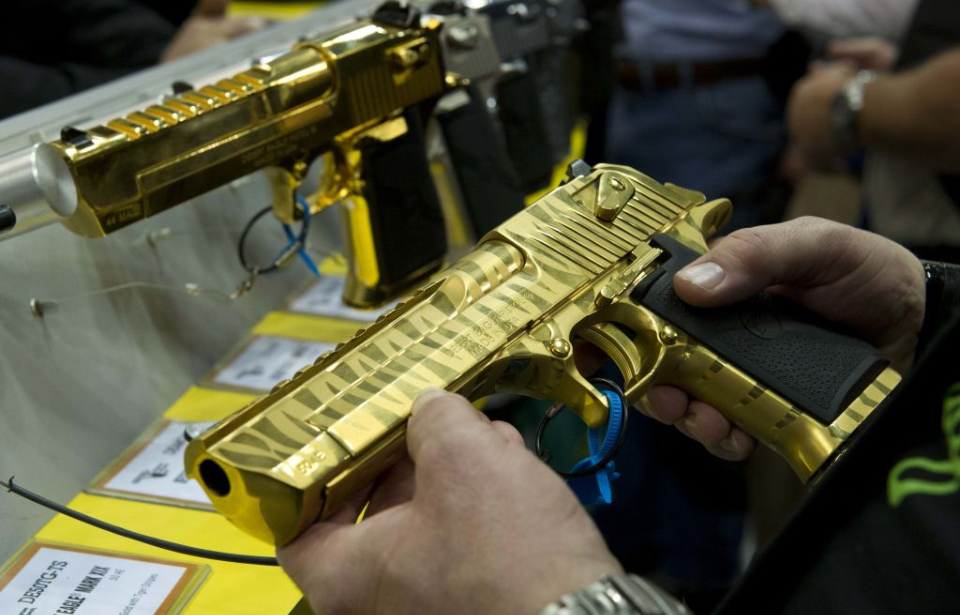The Desert Eagle is one of the most well-known firearms on the market today. While not intended for use on the battlefield, the weapon has made a name for itself with hunters and target shooters, who praise its incredibly solid punch. It’s also become quite popular in Hollywood, with many films featuring characters wielding the Israeli-made handgun. Due to these factors (and many more), it continues to be produced.
Production of the Desert Eagle
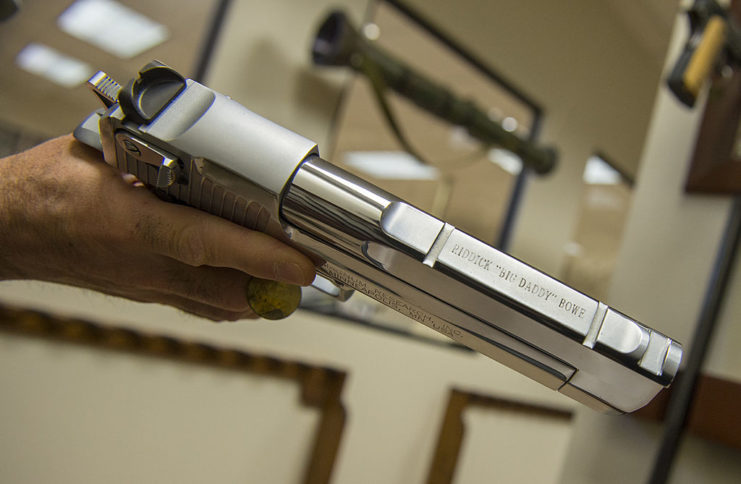
Development of the Desert Eagle began in Israel in 1979. It was designed by Bernard C. White of Magnum Research and Arnolds Streinbergs of the Riga Arm Institute, who filed a patent application in the United States for a gas-actuated pistol. This was later refined by Israel Military Industries (IMI Systems) and became the basis for the semi-automatic Desert Eagle.
The primary difference between the handgun and other designs is that the Desert Eagle is gas-powered. While this is common for rifles, such as the M16, semi-automatic pistols normally feature a short recoil or blowback design. There are positives and negatives to this. The Desert Eagle can fire much more powerful cartridges, but, at the same time, the use of unjacketed lead bullets means particles can be sheared off while it’s being fired, causing the handgun to malfunction.
Features hunters look for in a firearm
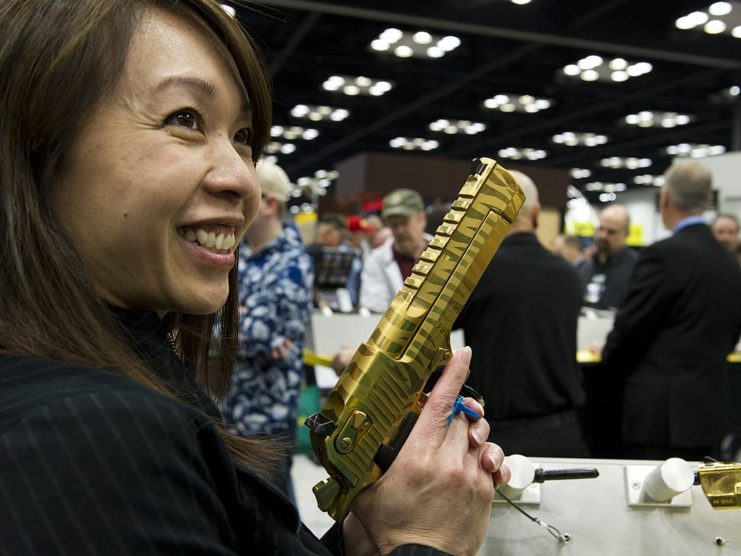
One of the most interesting features of the Desert Eagle has to do with its chambering. Through a detachable magazine, the basic Desert Eagle is capable of firing the .357 Smith & Wesson Magnum round, .44 Remington Magnums and .50 Action Express (AE) cartridges, while other models have been designed to also fire the .429 DE, .41 Remington Magnum and .440 Cor-Bon.
The Desert Eagle’s power has resulted in it becoming a favorite of many, and these fans commonly use it for target shooting. Individuals who choose to hunt with a handgun often find it to be an appropriate and solid weapon. When loaded with .44 or .50-caliber rounds, it can be used to hunt deer.
The Desert Eagle wasn’t intended for combat
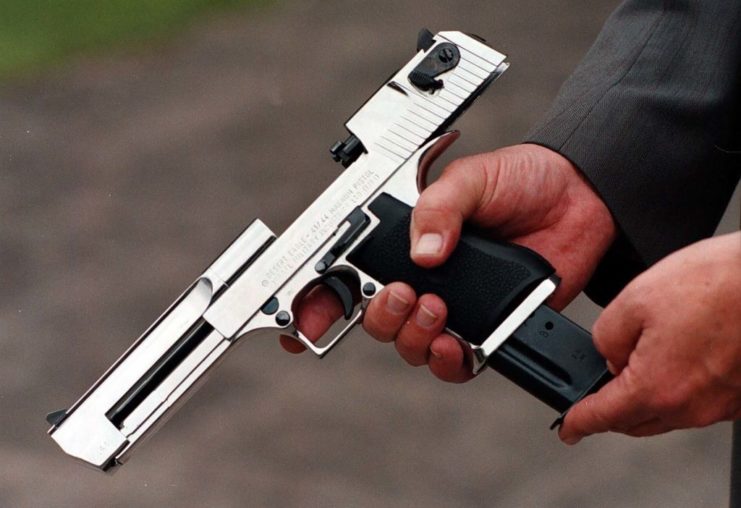
Many firearms are renowned for their use on the battlefield. Those that immediately come to mind are the M1911, the Hi-Power and the Beretta 92. The Desert Eagle, however, was never intended to see combat, despite having a maximum firing range of 220 yards.
The Desert Eagle isn’t used in battle because of its size. The handle is much bulkier than similar handguns, and soldiers would find it too heavy to handle and fire, with models coming it at between 3.9-4.2 pounds. It also features significant recoil and has a smaller magazine.
Despite these issues, however, it’s equipped by members of the Polish (JW GROM) and Portuguese (GOE) Special Forces.
There have been a number of film cameos
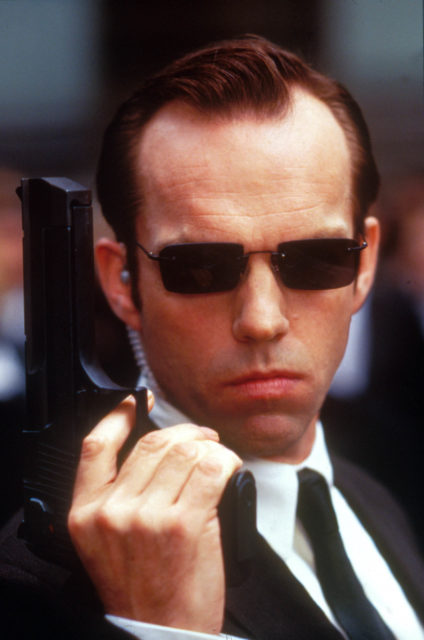
The reason the Desert Eagle is so well-known is that it’s made regular appearances in Hollywood films. The handgun makes a cameo in the 1999 cult-classic, The Boondock Saints, when the brothers take out a gun-wielding Russian mafia member with a toilet.
Another classic, 1987’s RoboCop, also depicts the firearm. During the final scene, a crooked businessman pulls a fancy-looking Desert Eagle on the cybernetic lawman. The most famous moment for the Desert Eagle, however, comes from 1999’s The Matrix. In one scene, Keanu Reeves‘ character, Neo, attempts to rescue his mentor, Morpheus, from a group of Mr. Smiths. Despite the enemy agents holding the Israeli firearm, Neo is able to complete his mission.
Other films featuring the handgun include Eraser (1996), Last Action Hero (1993), Demolition Man (1993) and The Last Boy Scout (1991).
The Desert Eagle’s enduring legacy
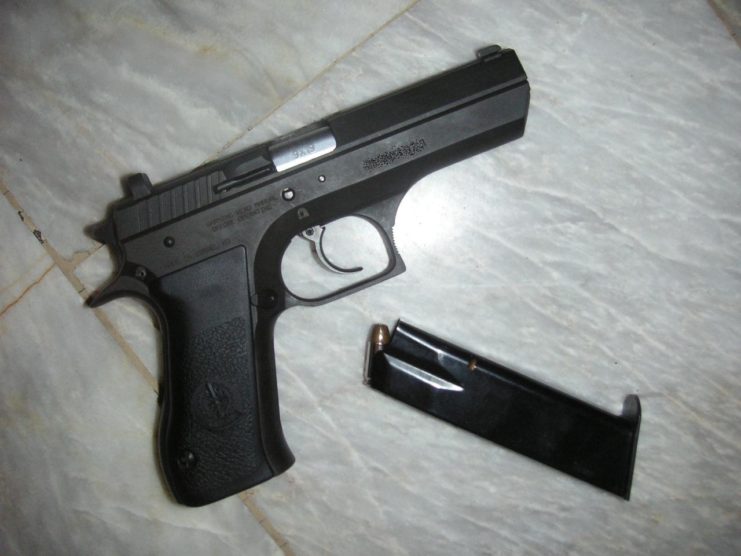
A number of variants of the Desert Eagle have been produced; the original model is no longer in production. The most recent version, the Mk XIX, is available with either 6- or 10-inch barrels, and comes with a muzzle break to reduce recoil.
More from us: M61 Vulcan: A Modern Take on the Civil War-Era Gatling Gun
While not a direct variant, the IWI Jericho 941, a significantly smaller Israeli-made pistol, bears a cosmetic resemblance to the Desert Eagle. This was done in an attempt to profit off the success of the popular handgun. Given how similar the two look, the Jericho 941 is often marketed as the “Baby Eagle.”
Due to its smaller size, the Jericho 941 is better designed for use in the field. As such, it’s equipped by a number of military and police forces across the world, including the South Korean Army and Marine Corps Military Police Special Duty Team; India’s Special Forces; and the Chilean Marine Corps.
